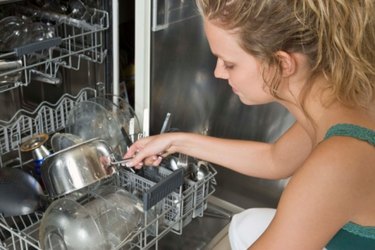
Your dishwasher is intended to make cleaning dishes easier. You just pop them in the machine, put in the detergent and let the appliance do the work for you. But sometimes the dishes are still dirty after running them through a wash cycle. A number of factors make the difference between a clean load of dishes and a dirty one.
Improper Cycle Setting
Video of the Day
Setting the dishwasher on a short wash cycle saves energy and water, but it may not get your dishes as clean as you were hoping. The short cycle is intended for dishes that aren't overly dirty, so if you have a load in that requires a thorough cleaning, make sure to run a complete wash cycle. Scrape off excess food and debris from your dishes and rinse them off under hot tap water prior to putting them in the dishwasher.
Video of the Day
Water Temperature
Water temperature is important in getting dishes clean. Using cool or warm water does not get the dishes as clean as using hot. Check the water temperature setting on the dishwasher and make sure it's set to hot. Also, check the temperature on the hot water tank in your home. It should be set at around 120 degrees Fahrenheit.
Detergents
Dishwasher detergent is essential to getting the dishes clean. Using the wrong type or amount of detergent can leave the dishes dirty. Make sure to use only the recommended amount according to the label. Use detergent designed for automatic dishwashers. If you have hard water, a bit more detergent may be required to get the dishes clean. You can buy test strips to test whether your water is hard or soft, then adjust your detergent levels accordingly.
Dirty Filter, Spray Arms or Detergent Dispenser
Your dishwasher has a filter, which is located at the bottom of the machine. Check the filter and clear it of any debris or buildup that may have accumulated. A clogged filter doesn't allow water to circulate freely, which can lead to dirty dishes.
The spray arms on the dishwasher can also become clogged with buildup. The spray arms are usually located at the bottom of the dishwasher; however, some models also have one at the top. Use a toothpick or similar item to clear any buildup stuck in the spray arms.
Scrub the detergent cups with an old toothbrush and hot, soapy water to get rid of soap buildup. If the detergent cups are caked with grime, they may not open appropriately or at the right time, which can lead to dirty dishes.
Other Causes
A dirty or faulty drain valve can cause your dishes to not get cleaned properly. The drain valve lets the dirty water out of the machine. Check the drain valve and make sure it's clear of debris. If you hear water running through the drain pipes connected to the dishwasher, the drain valve may be bad and need to be replaced.
Load your dishwasher the right way to ensure the spray arms and other parts can function properly. Make sure the spray arms are not obstructed by dishes, and allow for adequate space between the dishes so water can flow through properly.
Mineral deposits can sometimes build up on the heating elements and other internal parts of the machine. This minerals come from the tap water. To clean out the mineral deposits, fill the detergent dispenser with white vinegar and run a complete wash cycle.